MG414: Organisational Behaviour - Motivation and Leadership Report
VerifiedAdded on 2023/06/08
|16
|3340
|319
Report
AI Summary
This report delves into the realm of organisational behaviour management, specifically focusing on the application of behavioural principles within a business setting, with a particular emphasis on the interaction between behavioural sciences and organisational behaviour improvement. It provides an overview of organisational behavioural management and two key management theories that define the concept of OBM. The report summarizes behavioural theories and supports them with a questionnaire to present research findings. It also provides recommendations to assess and determine the optimum utilization of human resources for generating efficient output and results. The report analyzes the impact of motivation and leadership theories on employee behaviour, particularly within Unilever. It explores theories such as Maslow’s Hierarchy of Needs, the Great Man theory, and contingency theory, and their application in the workplace. Primary research findings, derived from a questionnaire, assess the factors influencing employee motivation, the role of management in fostering motivation, and the effectiveness of task delegation and leadership interactions within Unilever. The report concludes with recommendations for optimizing human resource utilization and generating efficient organizational outcomes.
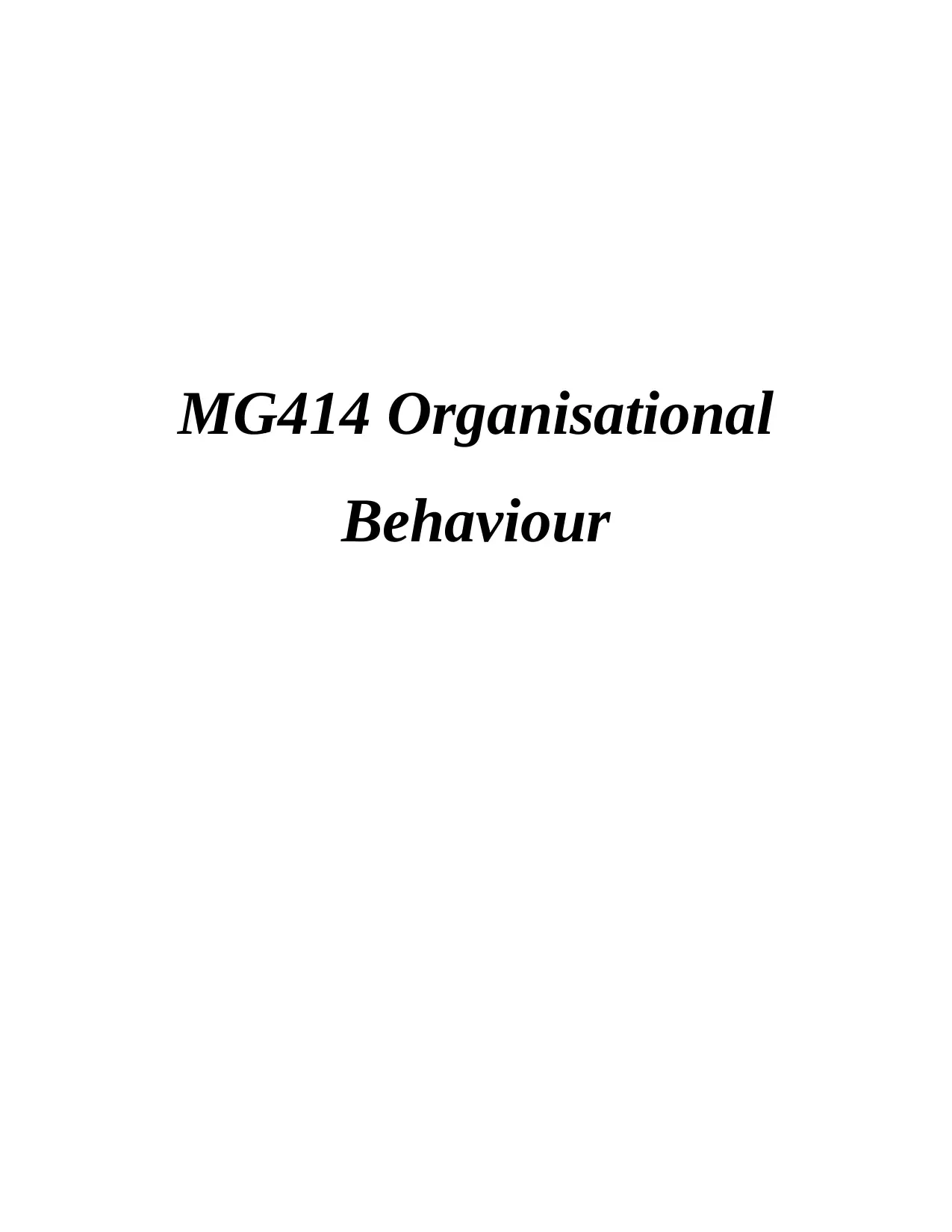
MG414 Organisational
Behaviour
Behaviour
Paraphrase This Document
Need a fresh take? Get an instant paraphrase of this document with our AI Paraphraser
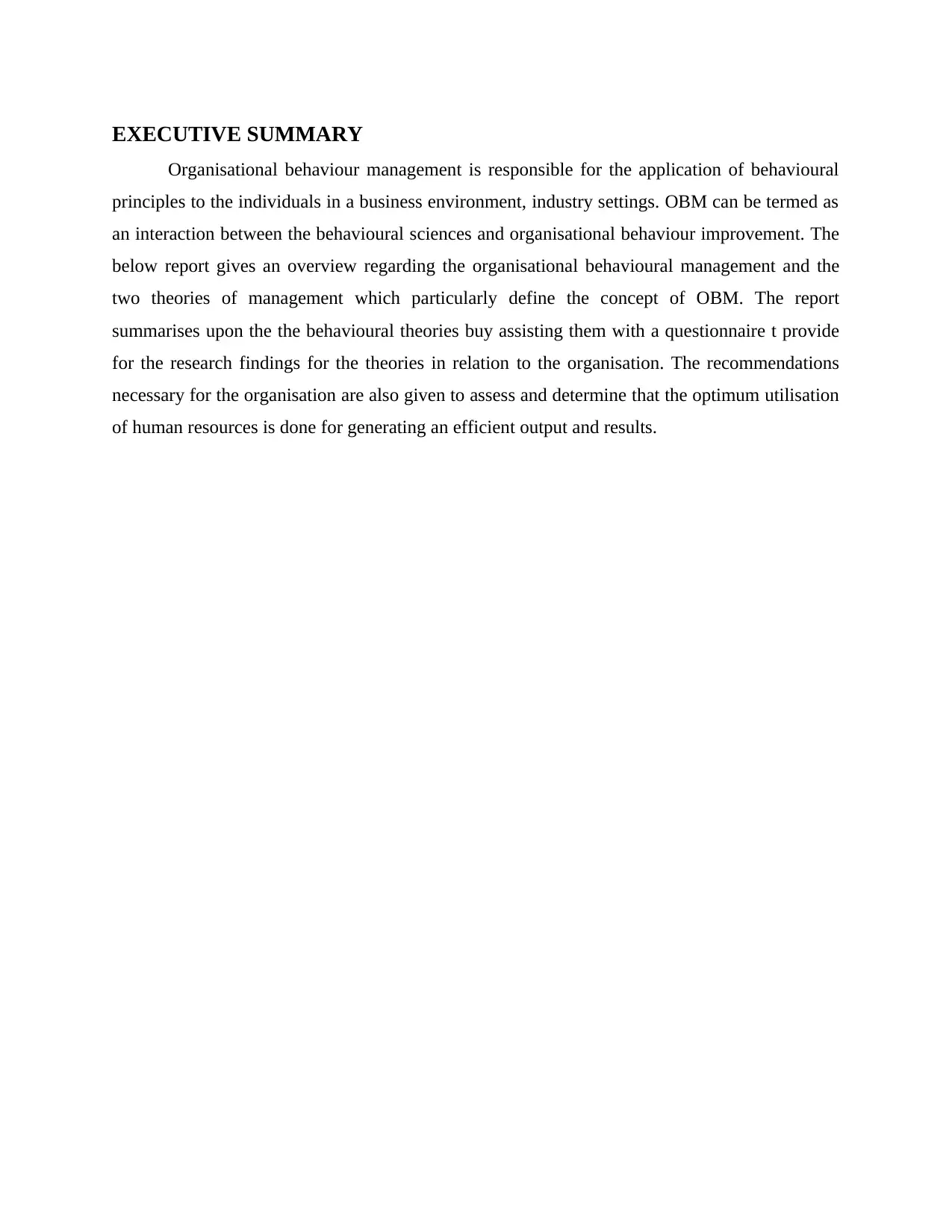
EXECUTIVE SUMMARY
Organisational behaviour management is responsible for the application of behavioural
principles to the individuals in a business environment, industry settings. OBM can be termed as
an interaction between the behavioural sciences and organisational behaviour improvement. The
below report gives an overview regarding the organisational behavioural management and the
two theories of management which particularly define the concept of OBM. The report
summarises upon the the behavioural theories buy assisting them with a questionnaire t provide
for the research findings for the theories in relation to the organisation. The recommendations
necessary for the organisation are also given to assess and determine that the optimum utilisation
of human resources is done for generating an efficient output and results.
Organisational behaviour management is responsible for the application of behavioural
principles to the individuals in a business environment, industry settings. OBM can be termed as
an interaction between the behavioural sciences and organisational behaviour improvement. The
below report gives an overview regarding the organisational behavioural management and the
two theories of management which particularly define the concept of OBM. The report
summarises upon the the behavioural theories buy assisting them with a questionnaire t provide
for the research findings for the theories in relation to the organisation. The recommendations
necessary for the organisation are also given to assess and determine that the optimum utilisation
of human resources is done for generating an efficient output and results.
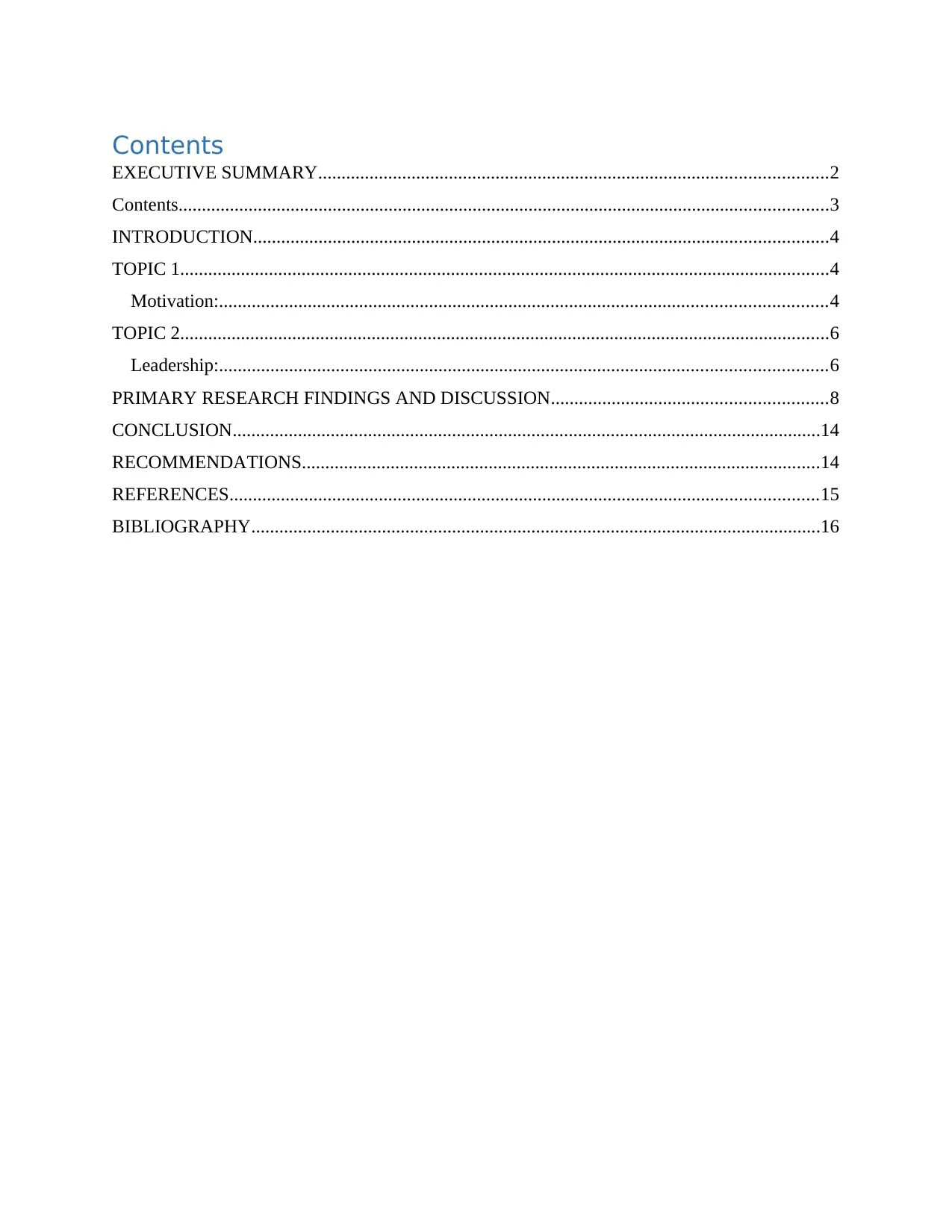
Contents
EXECUTIVE SUMMARY.............................................................................................................2
Contents...........................................................................................................................................3
INTRODUCTION...........................................................................................................................4
TOPIC 1...........................................................................................................................................4
Motivation:..................................................................................................................................4
TOPIC 2...........................................................................................................................................6
Leadership:..................................................................................................................................6
PRIMARY RESEARCH FINDINGS AND DISCUSSION...........................................................8
CONCLUSION..............................................................................................................................14
RECOMMENDATIONS...............................................................................................................14
REFERENCES..............................................................................................................................15
BIBLIOGRAPHY..........................................................................................................................16
EXECUTIVE SUMMARY.............................................................................................................2
Contents...........................................................................................................................................3
INTRODUCTION...........................................................................................................................4
TOPIC 1...........................................................................................................................................4
Motivation:..................................................................................................................................4
TOPIC 2...........................................................................................................................................6
Leadership:..................................................................................................................................6
PRIMARY RESEARCH FINDINGS AND DISCUSSION...........................................................8
CONCLUSION..............................................................................................................................14
RECOMMENDATIONS...............................................................................................................14
REFERENCES..............................................................................................................................15
BIBLIOGRAPHY..........................................................................................................................16
⊘ This is a preview!⊘
Do you want full access?
Subscribe today to unlock all pages.

Trusted by 1+ million students worldwide
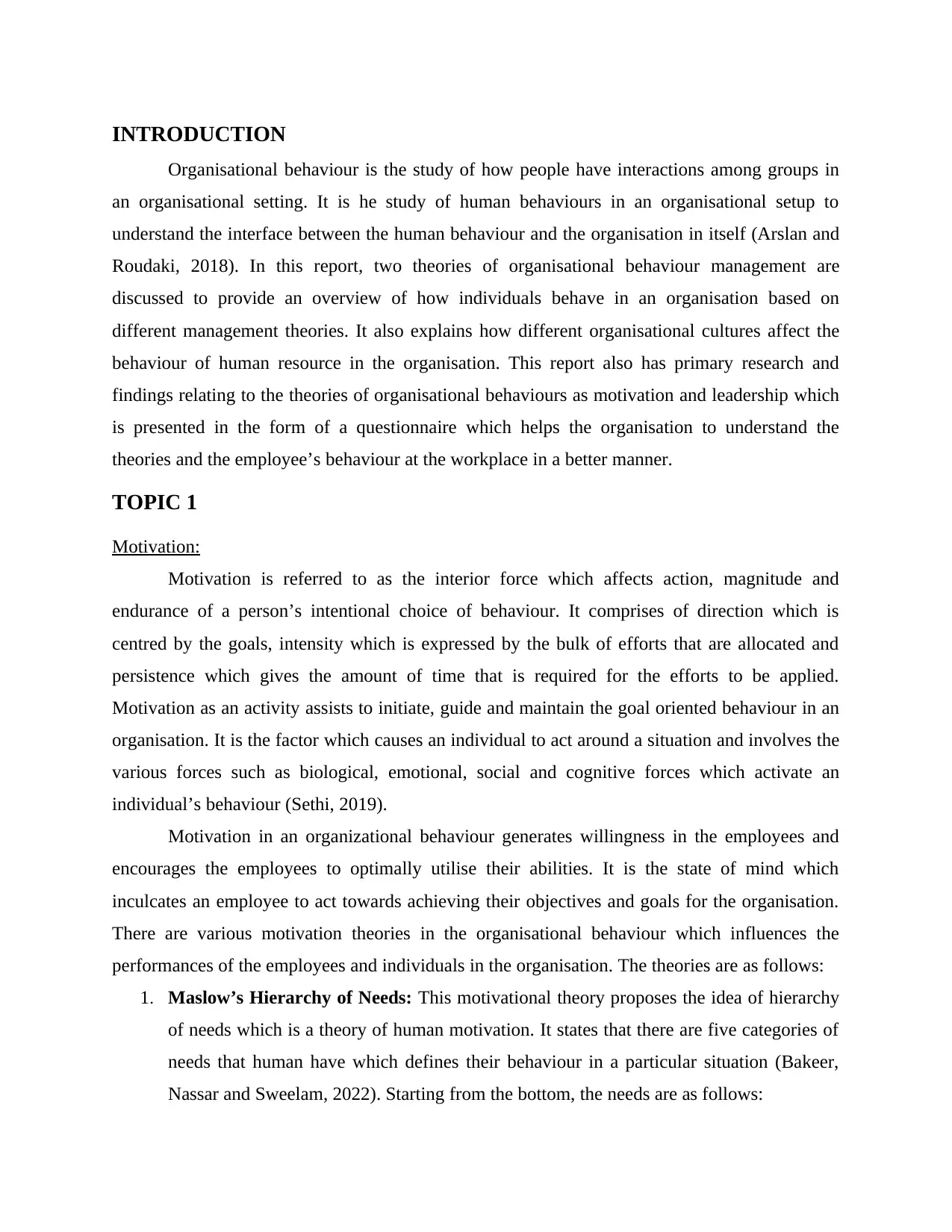
INTRODUCTION
Organisational behaviour is the study of how people have interactions among groups in
an organisational setting. It is he study of human behaviours in an organisational setup to
understand the interface between the human behaviour and the organisation in itself (Arslan and
Roudaki, 2018). In this report, two theories of organisational behaviour management are
discussed to provide an overview of how individuals behave in an organisation based on
different management theories. It also explains how different organisational cultures affect the
behaviour of human resource in the organisation. This report also has primary research and
findings relating to the theories of organisational behaviours as motivation and leadership which
is presented in the form of a questionnaire which helps the organisation to understand the
theories and the employee’s behaviour at the workplace in a better manner.
TOPIC 1
Motivation:
Motivation is referred to as the interior force which affects action, magnitude and
endurance of a person’s intentional choice of behaviour. It comprises of direction which is
centred by the goals, intensity which is expressed by the bulk of efforts that are allocated and
persistence which gives the amount of time that is required for the efforts to be applied.
Motivation as an activity assists to initiate, guide and maintain the goal oriented behaviour in an
organisation. It is the factor which causes an individual to act around a situation and involves the
various forces such as biological, emotional, social and cognitive forces which activate an
individual’s behaviour (Sethi, 2019).
Motivation in an organizational behaviour generates willingness in the employees and
encourages the employees to optimally utilise their abilities. It is the state of mind which
inculcates an employee to act towards achieving their objectives and goals for the organisation.
There are various motivation theories in the organisational behaviour which influences the
performances of the employees and individuals in the organisation. The theories are as follows:
1. Maslow’s Hierarchy of Needs: This motivational theory proposes the idea of hierarchy
of needs which is a theory of human motivation. It states that there are five categories of
needs that human have which defines their behaviour in a particular situation (Bakeer,
Nassar and Sweelam, 2022). Starting from the bottom, the needs are as follows:
Organisational behaviour is the study of how people have interactions among groups in
an organisational setting. It is he study of human behaviours in an organisational setup to
understand the interface between the human behaviour and the organisation in itself (Arslan and
Roudaki, 2018). In this report, two theories of organisational behaviour management are
discussed to provide an overview of how individuals behave in an organisation based on
different management theories. It also explains how different organisational cultures affect the
behaviour of human resource in the organisation. This report also has primary research and
findings relating to the theories of organisational behaviours as motivation and leadership which
is presented in the form of a questionnaire which helps the organisation to understand the
theories and the employee’s behaviour at the workplace in a better manner.
TOPIC 1
Motivation:
Motivation is referred to as the interior force which affects action, magnitude and
endurance of a person’s intentional choice of behaviour. It comprises of direction which is
centred by the goals, intensity which is expressed by the bulk of efforts that are allocated and
persistence which gives the amount of time that is required for the efforts to be applied.
Motivation as an activity assists to initiate, guide and maintain the goal oriented behaviour in an
organisation. It is the factor which causes an individual to act around a situation and involves the
various forces such as biological, emotional, social and cognitive forces which activate an
individual’s behaviour (Sethi, 2019).
Motivation in an organizational behaviour generates willingness in the employees and
encourages the employees to optimally utilise their abilities. It is the state of mind which
inculcates an employee to act towards achieving their objectives and goals for the organisation.
There are various motivation theories in the organisational behaviour which influences the
performances of the employees and individuals in the organisation. The theories are as follows:
1. Maslow’s Hierarchy of Needs: This motivational theory proposes the idea of hierarchy
of needs which is a theory of human motivation. It states that there are five categories of
needs that human have which defines their behaviour in a particular situation (Bakeer,
Nassar and Sweelam, 2022). Starting from the bottom, the needs are as follows:
Paraphrase This Document
Need a fresh take? Get an instant paraphrase of this document with our AI Paraphraser
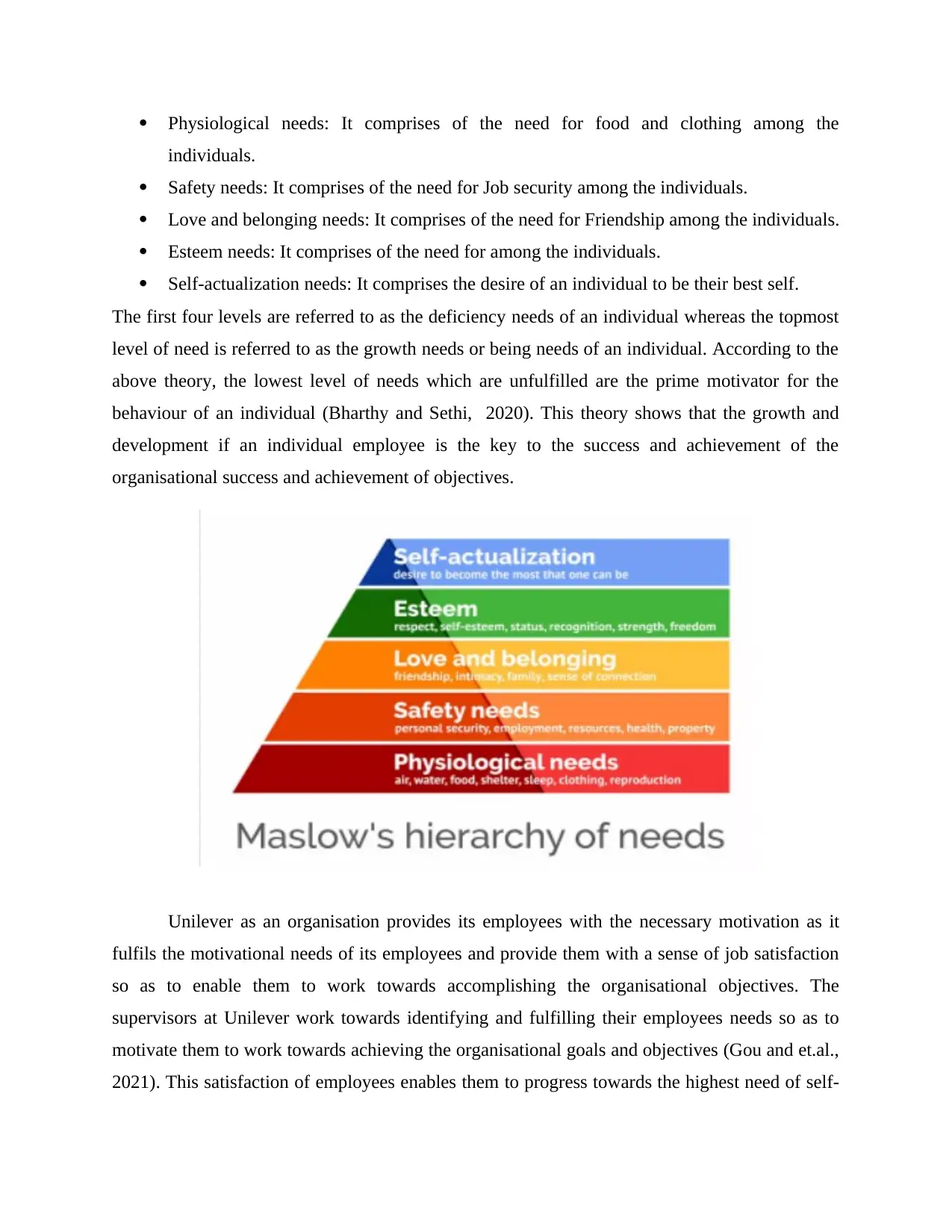
Physiological needs: It comprises of the need for food and clothing among the
individuals.
Safety needs: It comprises of the need for Job security among the individuals.
Love and belonging needs: It comprises of the need for Friendship among the individuals.
Esteem needs: It comprises of the need for among the individuals.
Self-actualization needs: It comprises the desire of an individual to be their best self.
The first four levels are referred to as the deficiency needs of an individual whereas the topmost
level of need is referred to as the growth needs or being needs of an individual. According to the
above theory, the lowest level of needs which are unfulfilled are the prime motivator for the
behaviour of an individual (Bharthy and Sethi, 2020). This theory shows that the growth and
development if an individual employee is the key to the success and achievement of the
organisational success and achievement of objectives.
Unilever as an organisation provides its employees with the necessary motivation as it
fulfils the motivational needs of its employees and provide them with a sense of job satisfaction
so as to enable them to work towards accomplishing the organisational objectives. The
supervisors at Unilever work towards identifying and fulfilling their employees needs so as to
motivate them to work towards achieving the organisational goals and objectives (Gou and et.al.,
2021). This satisfaction of employees enables them to progress towards the highest need of self-
individuals.
Safety needs: It comprises of the need for Job security among the individuals.
Love and belonging needs: It comprises of the need for Friendship among the individuals.
Esteem needs: It comprises of the need for among the individuals.
Self-actualization needs: It comprises the desire of an individual to be their best self.
The first four levels are referred to as the deficiency needs of an individual whereas the topmost
level of need is referred to as the growth needs or being needs of an individual. According to the
above theory, the lowest level of needs which are unfulfilled are the prime motivator for the
behaviour of an individual (Bharthy and Sethi, 2020). This theory shows that the growth and
development if an individual employee is the key to the success and achievement of the
organisational success and achievement of objectives.
Unilever as an organisation provides its employees with the necessary motivation as it
fulfils the motivational needs of its employees and provide them with a sense of job satisfaction
so as to enable them to work towards accomplishing the organisational objectives. The
supervisors at Unilever work towards identifying and fulfilling their employees needs so as to
motivate them to work towards achieving the organisational goals and objectives (Gou and et.al.,
2021). This satisfaction of employees enables them to progress towards the highest need of self-
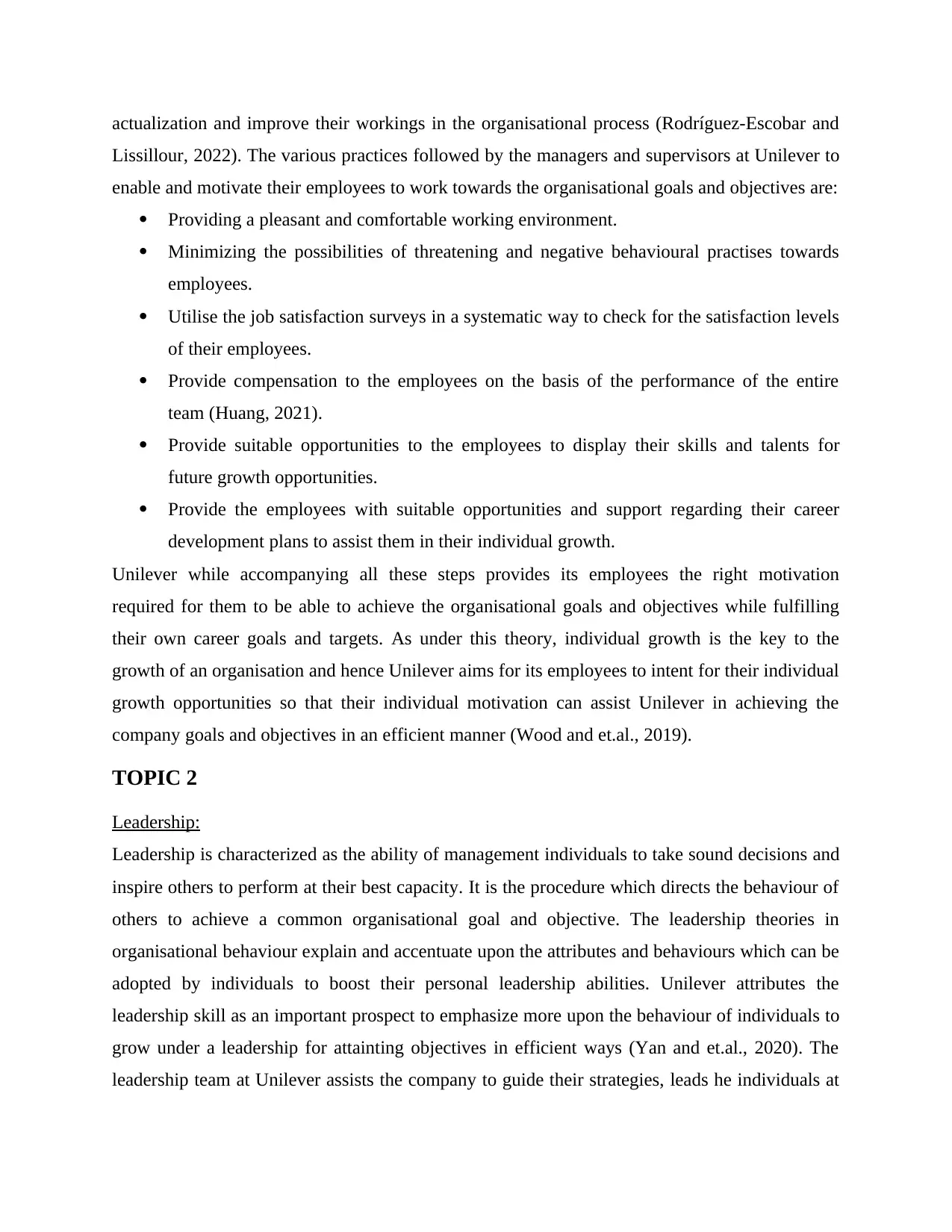
actualization and improve their workings in the organisational process (Rodríguez-Escobar and
Lissillour, 2022). The various practices followed by the managers and supervisors at Unilever to
enable and motivate their employees to work towards the organisational goals and objectives are:
Providing a pleasant and comfortable working environment.
Minimizing the possibilities of threatening and negative behavioural practises towards
employees.
Utilise the job satisfaction surveys in a systematic way to check for the satisfaction levels
of their employees.
Provide compensation to the employees on the basis of the performance of the entire
team (Huang, 2021).
Provide suitable opportunities to the employees to display their skills and talents for
future growth opportunities.
Provide the employees with suitable opportunities and support regarding their career
development plans to assist them in their individual growth.
Unilever while accompanying all these steps provides its employees the right motivation
required for them to be able to achieve the organisational goals and objectives while fulfilling
their own career goals and targets. As under this theory, individual growth is the key to the
growth of an organisation and hence Unilever aims for its employees to intent for their individual
growth opportunities so that their individual motivation can assist Unilever in achieving the
company goals and objectives in an efficient manner (Wood and et.al., 2019).
TOPIC 2
Leadership:
Leadership is characterized as the ability of management individuals to take sound decisions and
inspire others to perform at their best capacity. It is the procedure which directs the behaviour of
others to achieve a common organisational goal and objective. The leadership theories in
organisational behaviour explain and accentuate upon the attributes and behaviours which can be
adopted by individuals to boost their personal leadership abilities. Unilever attributes the
leadership skill as an important prospect to emphasize more upon the behaviour of individuals to
grow under a leadership for attainting objectives in efficient ways (Yan and et.al., 2020). The
leadership team at Unilever assists the company to guide their strategies, leads he individuals at
Lissillour, 2022). The various practices followed by the managers and supervisors at Unilever to
enable and motivate their employees to work towards the organisational goals and objectives are:
Providing a pleasant and comfortable working environment.
Minimizing the possibilities of threatening and negative behavioural practises towards
employees.
Utilise the job satisfaction surveys in a systematic way to check for the satisfaction levels
of their employees.
Provide compensation to the employees on the basis of the performance of the entire
team (Huang, 2021).
Provide suitable opportunities to the employees to display their skills and talents for
future growth opportunities.
Provide the employees with suitable opportunities and support regarding their career
development plans to assist them in their individual growth.
Unilever while accompanying all these steps provides its employees the right motivation
required for them to be able to achieve the organisational goals and objectives while fulfilling
their own career goals and targets. As under this theory, individual growth is the key to the
growth of an organisation and hence Unilever aims for its employees to intent for their individual
growth opportunities so that their individual motivation can assist Unilever in achieving the
company goals and objectives in an efficient manner (Wood and et.al., 2019).
TOPIC 2
Leadership:
Leadership is characterized as the ability of management individuals to take sound decisions and
inspire others to perform at their best capacity. It is the procedure which directs the behaviour of
others to achieve a common organisational goal and objective. The leadership theories in
organisational behaviour explain and accentuate upon the attributes and behaviours which can be
adopted by individuals to boost their personal leadership abilities. Unilever attributes the
leadership skill as an important prospect to emphasize more upon the behaviour of individuals to
grow under a leadership for attainting objectives in efficient ways (Yan and et.al., 2020). The
leadership team at Unilever assists the company to guide their strategies, leads he individuals at
⊘ This is a preview!⊘
Do you want full access?
Subscribe today to unlock all pages.

Trusted by 1+ million students worldwide
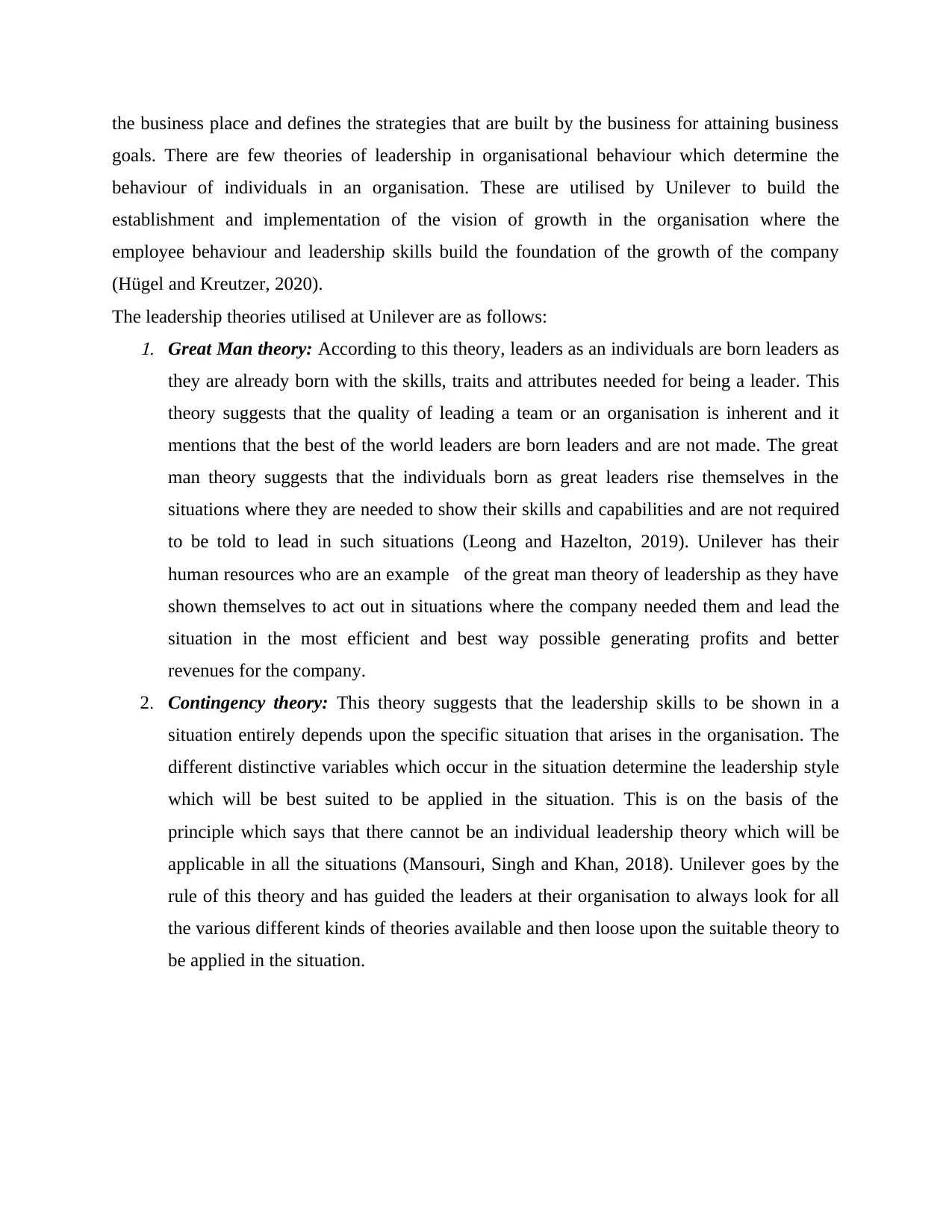
the business place and defines the strategies that are built by the business for attaining business
goals. There are few theories of leadership in organisational behaviour which determine the
behaviour of individuals in an organisation. These are utilised by Unilever to build the
establishment and implementation of the vision of growth in the organisation where the
employee behaviour and leadership skills build the foundation of the growth of the company
(Hügel and Kreutzer, 2020).
The leadership theories utilised at Unilever are as follows:1. Great Man theory: According to this theory, leaders as an individuals are born leaders as
they are already born with the skills, traits and attributes needed for being a leader. This
theory suggests that the quality of leading a team or an organisation is inherent and it
mentions that the best of the world leaders are born leaders and are not made. The great
man theory suggests that the individuals born as great leaders rise themselves in the
situations where they are needed to show their skills and capabilities and are not required
to be told to lead in such situations (Leong and Hazelton, 2019). Unilever has their
human resources who are an example of the great man theory of leadership as they have
shown themselves to act out in situations where the company needed them and lead the
situation in the most efficient and best way possible generating profits and better
revenues for the company.
2. Contingency theory: This theory suggests that the leadership skills to be shown in a
situation entirely depends upon the specific situation that arises in the organisation. The
different distinctive variables which occur in the situation determine the leadership style
which will be best suited to be applied in the situation. This is on the basis of the
principle which says that there cannot be an individual leadership theory which will be
applicable in all the situations (Mansouri, Singh and Khan, 2018). Unilever goes by the
rule of this theory and has guided the leaders at their organisation to always look for all
the various different kinds of theories available and then loose upon the suitable theory to
be applied in the situation.
goals. There are few theories of leadership in organisational behaviour which determine the
behaviour of individuals in an organisation. These are utilised by Unilever to build the
establishment and implementation of the vision of growth in the organisation where the
employee behaviour and leadership skills build the foundation of the growth of the company
(Hügel and Kreutzer, 2020).
The leadership theories utilised at Unilever are as follows:1. Great Man theory: According to this theory, leaders as an individuals are born leaders as
they are already born with the skills, traits and attributes needed for being a leader. This
theory suggests that the quality of leading a team or an organisation is inherent and it
mentions that the best of the world leaders are born leaders and are not made. The great
man theory suggests that the individuals born as great leaders rise themselves in the
situations where they are needed to show their skills and capabilities and are not required
to be told to lead in such situations (Leong and Hazelton, 2019). Unilever has their
human resources who are an example of the great man theory of leadership as they have
shown themselves to act out in situations where the company needed them and lead the
situation in the most efficient and best way possible generating profits and better
revenues for the company.
2. Contingency theory: This theory suggests that the leadership skills to be shown in a
situation entirely depends upon the specific situation that arises in the organisation. The
different distinctive variables which occur in the situation determine the leadership style
which will be best suited to be applied in the situation. This is on the basis of the
principle which says that there cannot be an individual leadership theory which will be
applicable in all the situations (Mansouri, Singh and Khan, 2018). Unilever goes by the
rule of this theory and has guided the leaders at their organisation to always look for all
the various different kinds of theories available and then loose upon the suitable theory to
be applied in the situation.
Paraphrase This Document
Need a fresh take? Get an instant paraphrase of this document with our AI Paraphraser
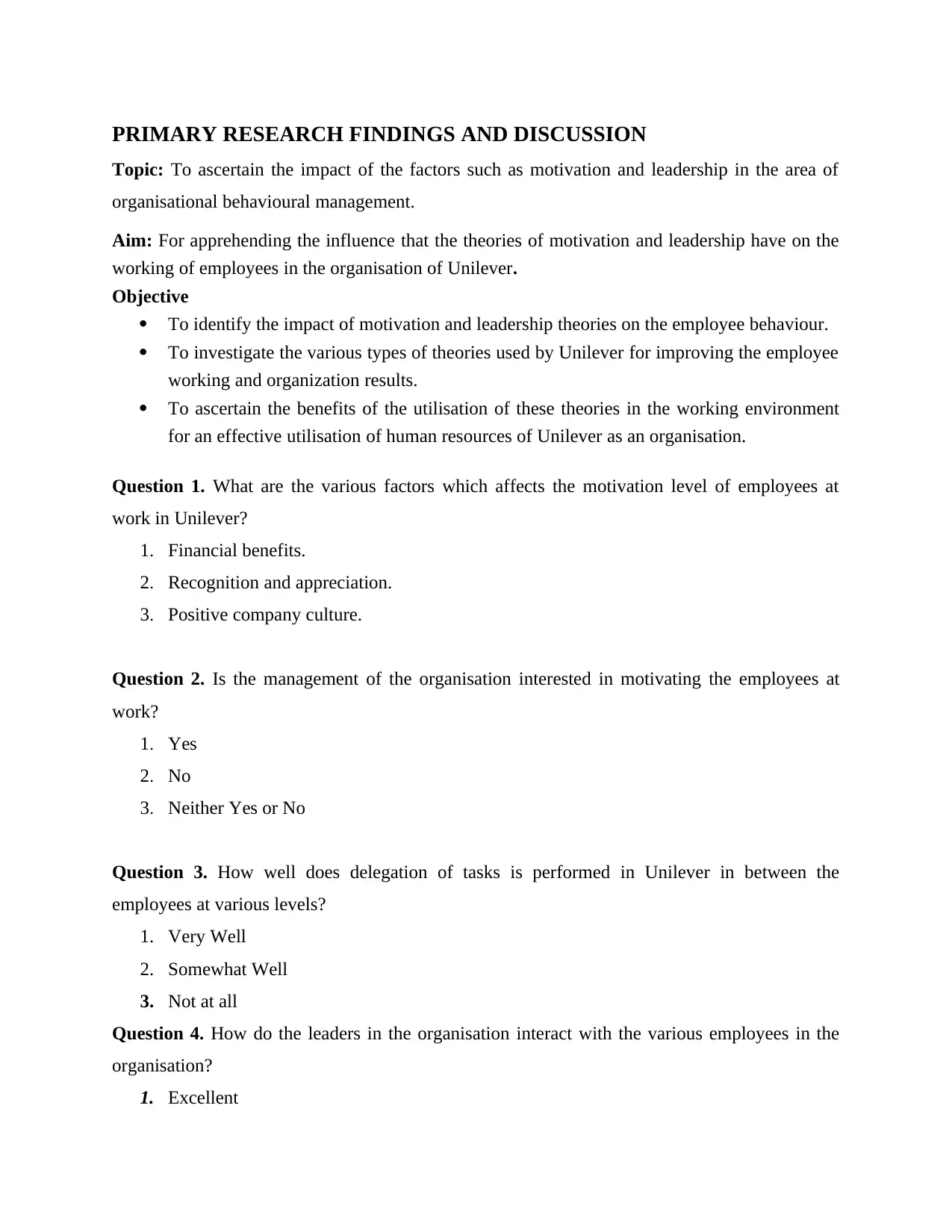
PRIMARY RESEARCH FINDINGS AND DISCUSSION
Topic: To ascertain the impact of the factors such as motivation and leadership in the area of
organisational behavioural management.
Aim: For apprehending the influence that the theories of motivation and leadership have on the
working of employees in the organisation of Unilever.
Objective
To identify the impact of motivation and leadership theories on the employee behaviour.
To investigate the various types of theories used by Unilever for improving the employee
working and organization results.
To ascertain the benefits of the utilisation of these theories in the working environment
for an effective utilisation of human resources of Unilever as an organisation.
Question 1. What are the various factors which affects the motivation level of employees at
work in Unilever?
1. Financial benefits.
2. Recognition and appreciation.
3. Positive company culture.
Question 2. Is the management of the organisation interested in motivating the employees at
work?
1. Yes
2. No
3. Neither Yes or No
Question 3. How well does delegation of tasks is performed in Unilever in between the
employees at various levels?
1. Very Well
2. Somewhat Well
3. Not at all
Question 4. How do the leaders in the organisation interact with the various employees in the
organisation?
1. Excellent
Topic: To ascertain the impact of the factors such as motivation and leadership in the area of
organisational behavioural management.
Aim: For apprehending the influence that the theories of motivation and leadership have on the
working of employees in the organisation of Unilever.
Objective
To identify the impact of motivation and leadership theories on the employee behaviour.
To investigate the various types of theories used by Unilever for improving the employee
working and organization results.
To ascertain the benefits of the utilisation of these theories in the working environment
for an effective utilisation of human resources of Unilever as an organisation.
Question 1. What are the various factors which affects the motivation level of employees at
work in Unilever?
1. Financial benefits.
2. Recognition and appreciation.
3. Positive company culture.
Question 2. Is the management of the organisation interested in motivating the employees at
work?
1. Yes
2. No
3. Neither Yes or No
Question 3. How well does delegation of tasks is performed in Unilever in between the
employees at various levels?
1. Very Well
2. Somewhat Well
3. Not at all
Question 4. How do the leaders in the organisation interact with the various employees in the
organisation?
1. Excellent
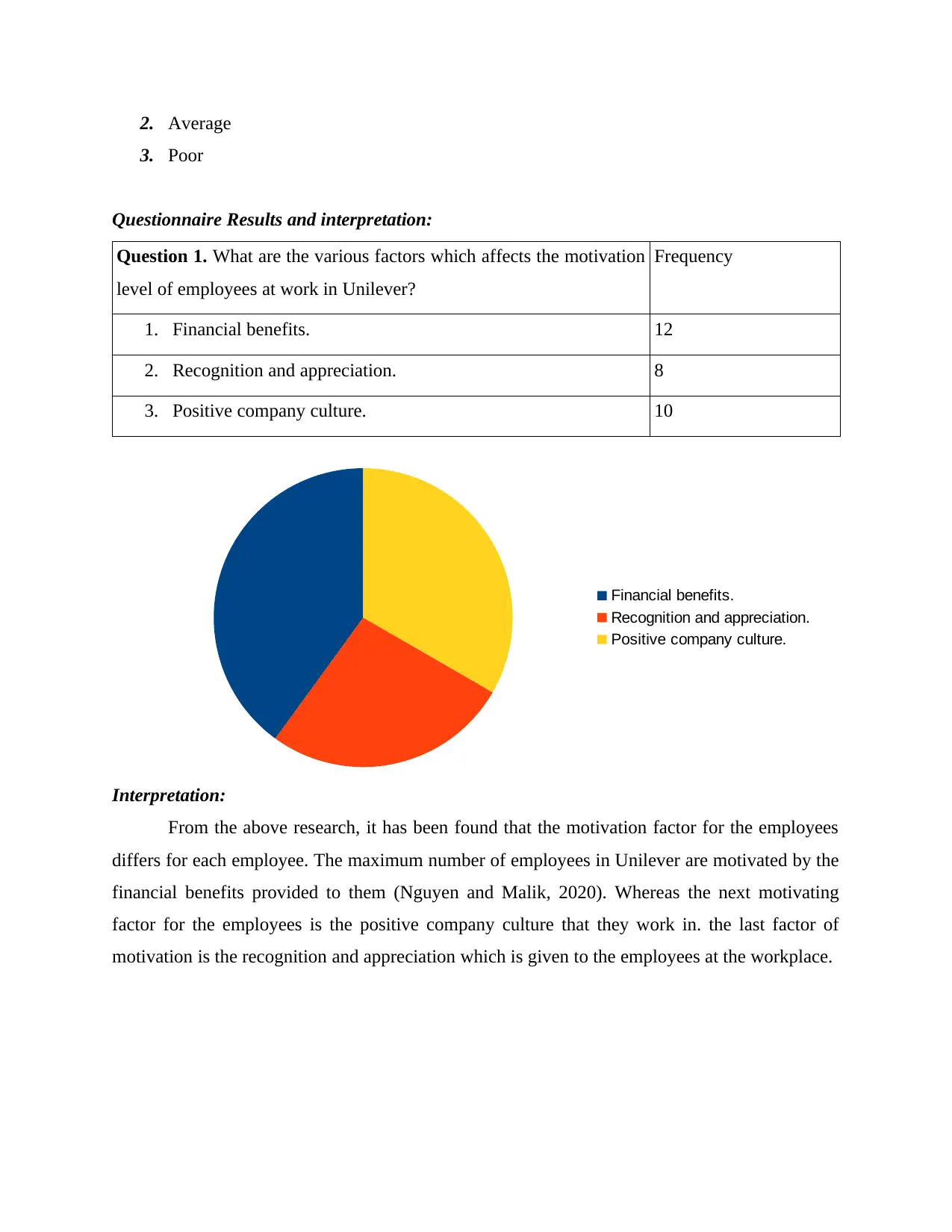
2. Average
3. Poor
Questionnaire Results and interpretation:
Question 1. What are the various factors which affects the motivation
level of employees at work in Unilever?
Frequency
1. Financial benefits. 12
2. Recognition and appreciation. 8
3. Positive company culture. 10
Interpretation:
From the above research, it has been found that the motivation factor for the employees
differs for each employee. The maximum number of employees in Unilever are motivated by the
financial benefits provided to them (Nguyen and Malik, 2020). Whereas the next motivating
factor for the employees is the positive company culture that they work in. the last factor of
motivation is the recognition and appreciation which is given to the employees at the workplace.
Financial benefits.
Recognition and appreciation.
Positive company culture.
3. Poor
Questionnaire Results and interpretation:
Question 1. What are the various factors which affects the motivation
level of employees at work in Unilever?
Frequency
1. Financial benefits. 12
2. Recognition and appreciation. 8
3. Positive company culture. 10
Interpretation:
From the above research, it has been found that the motivation factor for the employees
differs for each employee. The maximum number of employees in Unilever are motivated by the
financial benefits provided to them (Nguyen and Malik, 2020). Whereas the next motivating
factor for the employees is the positive company culture that they work in. the last factor of
motivation is the recognition and appreciation which is given to the employees at the workplace.
Financial benefits.
Recognition and appreciation.
Positive company culture.
⊘ This is a preview!⊘
Do you want full access?
Subscribe today to unlock all pages.

Trusted by 1+ million students worldwide
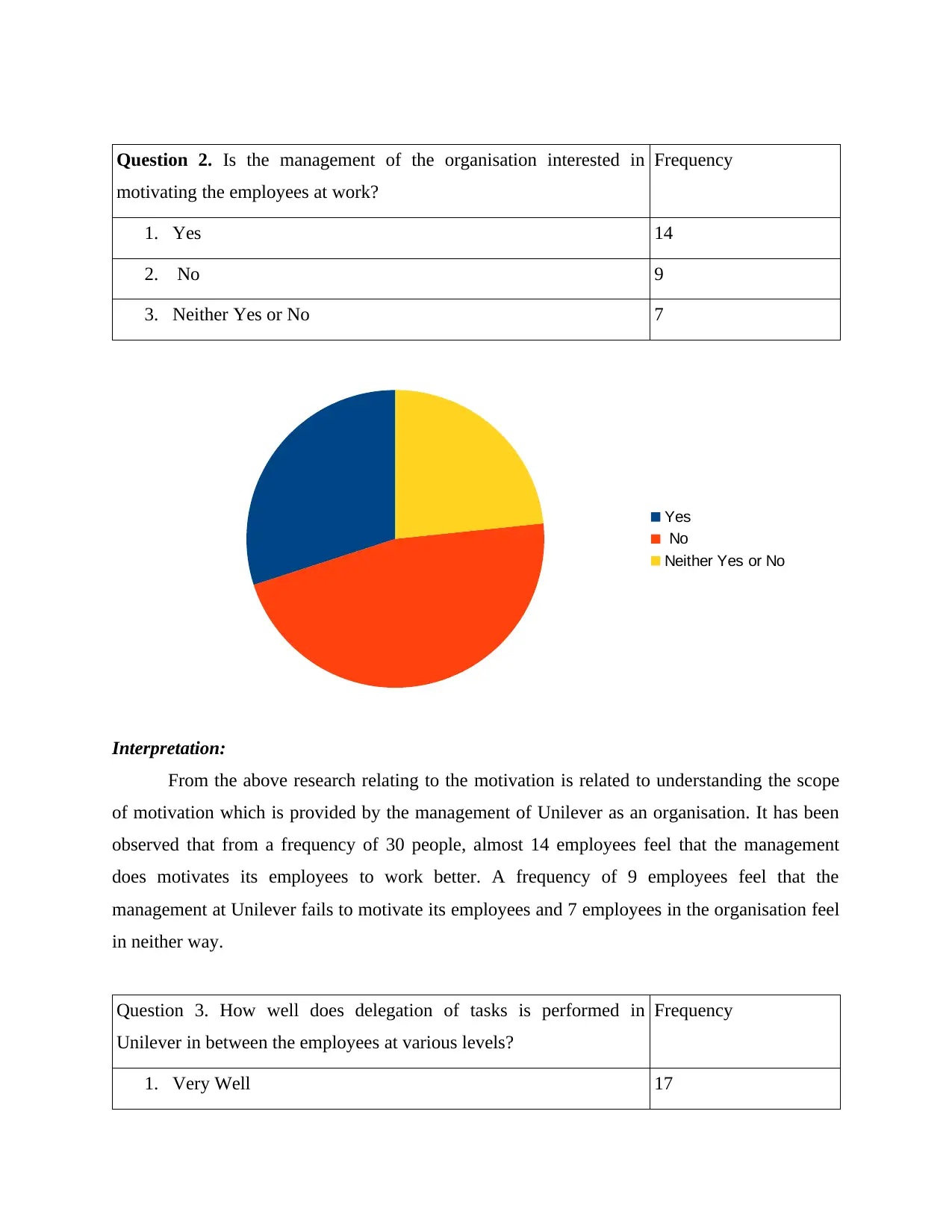
Question 2. Is the management of the organisation interested in
motivating the employees at work?
Frequency
1. Yes 14
2. No 9
3. Neither Yes or No 7
Interpretation:
From the above research relating to the motivation is related to understanding the scope
of motivation which is provided by the management of Unilever as an organisation. It has been
observed that from a frequency of 30 people, almost 14 employees feel that the management
does motivates its employees to work better. A frequency of 9 employees feel that the
management at Unilever fails to motivate its employees and 7 employees in the organisation feel
in neither way.
Question 3. How well does delegation of tasks is performed in
Unilever in between the employees at various levels?
Frequency
1. Very Well 17
Yes
No
Neither Yes or No
motivating the employees at work?
Frequency
1. Yes 14
2. No 9
3. Neither Yes or No 7
Interpretation:
From the above research relating to the motivation is related to understanding the scope
of motivation which is provided by the management of Unilever as an organisation. It has been
observed that from a frequency of 30 people, almost 14 employees feel that the management
does motivates its employees to work better. A frequency of 9 employees feel that the
management at Unilever fails to motivate its employees and 7 employees in the organisation feel
in neither way.
Question 3. How well does delegation of tasks is performed in
Unilever in between the employees at various levels?
Frequency
1. Very Well 17
Yes
No
Neither Yes or No
Paraphrase This Document
Need a fresh take? Get an instant paraphrase of this document with our AI Paraphraser
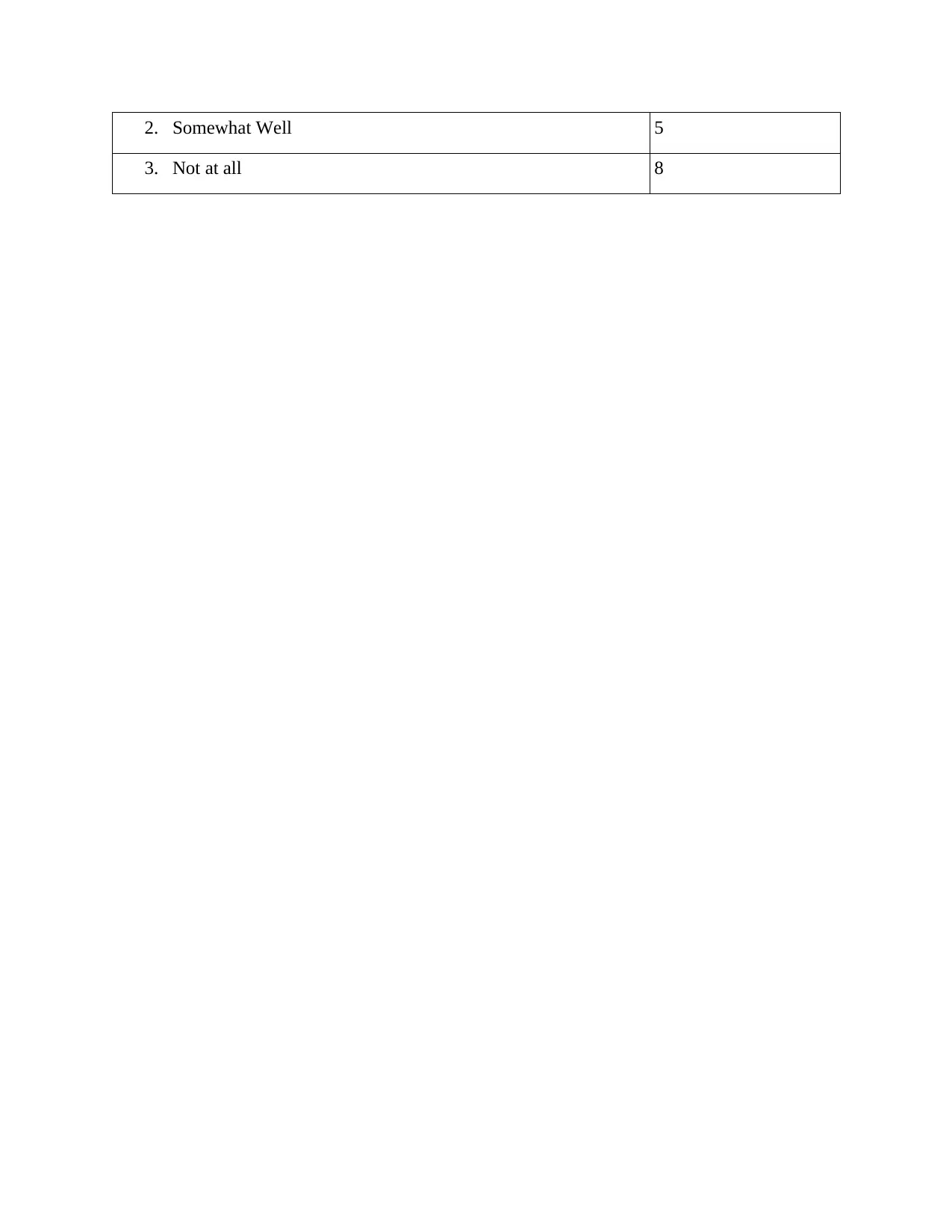
2. Somewhat Well 5
3. Not at all 8
3. Not at all 8
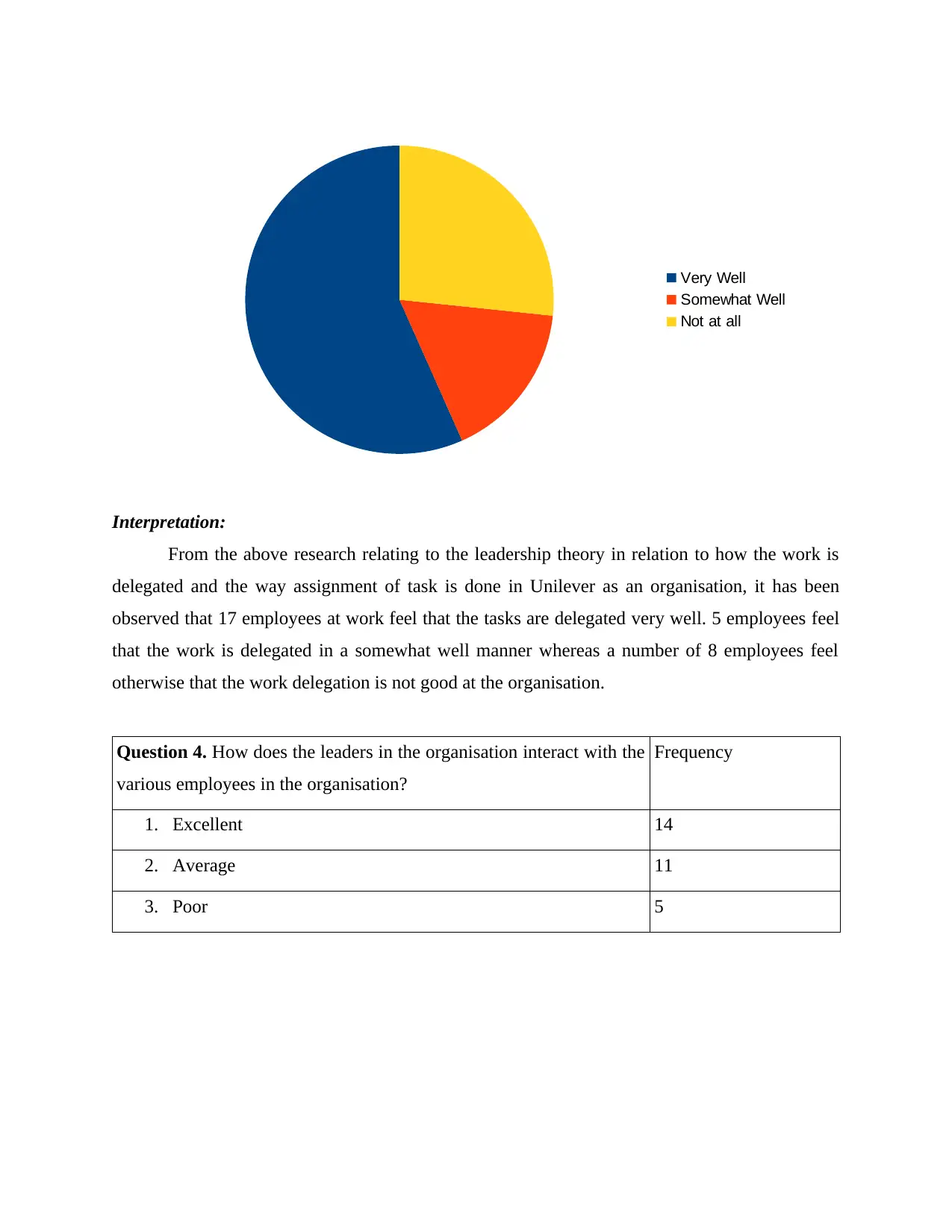
Interpretation:
From the above research relating to the leadership theory in relation to how the work is
delegated and the way assignment of task is done in Unilever as an organisation, it has been
observed that 17 employees at work feel that the tasks are delegated very well. 5 employees feel
that the work is delegated in a somewhat well manner whereas a number of 8 employees feel
otherwise that the work delegation is not good at the organisation.
Question 4. How does the leaders in the organisation interact with the
various employees in the organisation?
Frequency
1. Excellent 14
2. Average 11
3. Poor 5
Very Well
Somewhat Well
Not at all
From the above research relating to the leadership theory in relation to how the work is
delegated and the way assignment of task is done in Unilever as an organisation, it has been
observed that 17 employees at work feel that the tasks are delegated very well. 5 employees feel
that the work is delegated in a somewhat well manner whereas a number of 8 employees feel
otherwise that the work delegation is not good at the organisation.
Question 4. How does the leaders in the organisation interact with the
various employees in the organisation?
Frequency
1. Excellent 14
2. Average 11
3. Poor 5
Very Well
Somewhat Well
Not at all
⊘ This is a preview!⊘
Do you want full access?
Subscribe today to unlock all pages.

Trusted by 1+ million students worldwide
1 out of 16
Related Documents
Your All-in-One AI-Powered Toolkit for Academic Success.
+13062052269
info@desklib.com
Available 24*7 on WhatsApp / Email
![[object Object]](/_next/static/media/star-bottom.7253800d.svg)
Unlock your academic potential
Copyright © 2020–2025 A2Z Services. All Rights Reserved. Developed and managed by ZUCOL.



